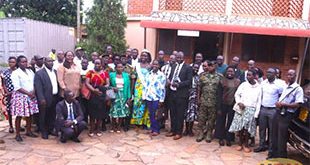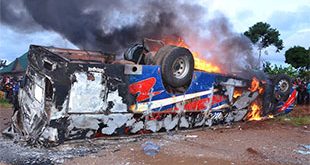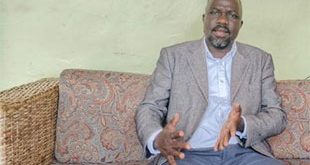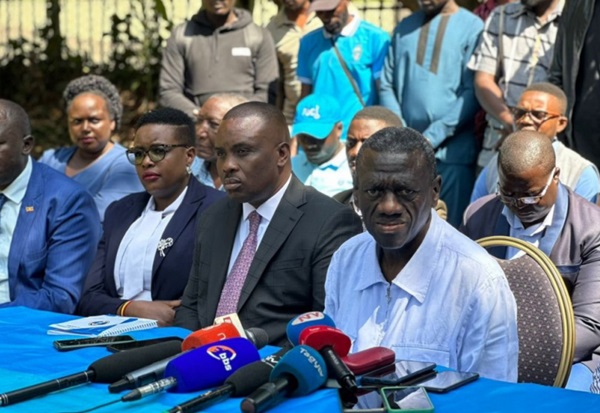
Tensions as Katonga faction plans to dissolve party
NEWS ANALYSIS | IAN KATUSIIME | News that the Forum for Democratic Change (FDC) could be dissolved has caught many by surprise. A Delegates Conference organised by the Katonga faction slated for August 19 could seal the fate of what was once the largest and most formidable opposition party in Uganda.
The party has been in terminal decline since an internal row last year spilled in the open with one side headed by party president Patrick Amuriat said to be doing the bidding of the ruling National Resistance Movement (NRM) of President Yoweri Museveni.
Now the Katonga faction that is headed by Dr Kizza Besigye, one of the founder members and its former president, is reportedly in high gear to dissolve the FDC party and brand to start a new party which will drive the agenda for the 2026 presidential elections.
According to Chapter 10 of the FDC constitution, the National Delegates Conference may dissolve the party with a two thirds majority decision. Not to be outdone, Amuriat and his secretary general Nandala Mafabi are soldiering on with a national tour that has been ongoing for weeks.
On Aug. 17, Amuriat and Mafabi headlined rallies in Mukono and Buikwe districts aimed at mobilisation and recruitment of new members.
Katonga says FDC cannot continue operating under a façade. Some of the prominent members of the faction such as Kira Municipality MP Ibrahim Ssemujju have repeatedly said the FDC is dead in the water and are intent on forming a new political vehicle given that they have not been allowed to set foot at the party headquarters in Najjanakumbi.
Brian Atuheire, a card-carrying member of the FDC since 2008 said he is ready for the new shift. He is a member of the Katonga brigade.
“I will leave the party and I will be engaged in forming a new one if other comrades agree,” he told The Independent early this year.
The news of dissolution came at a time when Katonga was celebrating a ruling by the High Court that threw out a case filed by FDC vice chaiperson James Wante accusing the party national chairman Wasswa Birigwa of impersonation. The court cited a lack of evidence.
“I am happy to continue doing my work unabated,” Birigwa said outside court. The ruling was a shot in the arm for the team that wants to start a new chapter by closing the one named FDC.
The development also caught the Electoral Commission by surprise. But according to the Political Parties and Organisations Act 2005, the law that governs parties, the EC has no say when a party intends to close shop.
Section 21 sub section 1 of the Act states “Where a political party or organisation does not comply with the provisions of this Act, the Electoral Commission may by writing require compliance; and if the political party or organisation persists in non-compliance, the Electoral Commission may apply to the High Court for an order winding up the political party or organisation.”
Some of the lawyers The Independent spoke declined to comment on the matter citing conflict of interest and referred us to the party constitution.
In an interview with the Observer newspaper, Ssemujju said the Katonga faction would hold a delegates’ conference on Aug. 19 to formally dissolve the party and start a new one. Ssemujju has been FDC spokesperson and party whip in parliament.
In the latter position, he was booted by secretary general Nandala Mafabi in another sharp dispute that rocked the party.
Commentators have warned about the group about the tumult ahead in forming a new party since the new outfit in whatever shape of form will be hounded by state agents. It is what happened to National Unity Platform after it was registered as a party saw in the intense election build up in 2020.
The new party headed by Robert Kyagulanyi aka Bobi Wine was hit by lawsuits, instigated by the state on grounds that it was illegally registered, and party officials faced arrest and persecution from security officials.
But Ssemujju says “starting a new party has never been particularly difficult”.
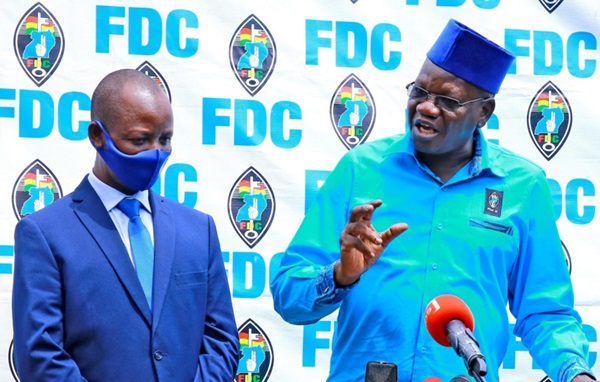
In an interview he said the challenge lies in growing and sustaining a party.
“To begin, you need 50 signatures from two-thirds of the districts and then register with the Electoral Commission. However, transforming a new party into a formidable force depends on the circumstances,” he says.
How formidable the new party will be is now up in the air as will be the fate of 32 MPs in the eleventh parliament who were elected on the FDC ticket.
Amuriat and Mafabi have also stayed silent as the Katonga group seek to put them out of business. From the look of it, the duo look outnumbered. It will also be interesting how their supposedly powerful backers will counter the move to deregister the party.
Amuriat and Nandala also do not have the star power of their rivals who also boast of names like Lord Mayor Erias Lukwago, Deputy Lord Mayor Doreen Nyanjura, Buhweju County MP Francis Mwijukye and a few others who have been faces of the party.
The above lot are some of those who have visible in recent developments affecting the party such as the arrest of 36 FDC activists in Kenya on July 23. The brutal arrest on foreign soil appeared to be another crucible for the party in its twentieth year. The activists are facing terrorism charges and are remanded to Luzira Prison. The are part of the Katonga Road faction.
The 36 were arrested in Kisumu County, near the Ugandan border while attending a leadership training. Police however stated that the activists were in Kenya to receive terrorism training in a move that has been widely condemned as political persecution. Neither Amuriat nor Mafabi commented on the arrests of their erstwhile compatriots.
Some of those arrested include Ronald Muhinda, George Ekwaro, Karl Marx M’Mugeni, Charles Nkonge, Henry Buyondo, Nalunkunga Grace, Apare Sarah, Mpungu Henry, Owamani James, Bukenya Hakim, Maido Latif, George Wazinge, Ahimbisibwe Owen, and Innocent Museveni.
Reports say Kenyan and Ugandan security personnel stormed the hotel where the activists were and violently arrested the 36 and drove them back to Uganda in the middle of the night. On return to Kampala, External Security Organsation (ESO) officers paraded the politicians before the media at Kololo Independence Grounds where they said the FDC members were engaging in suspected terrorist activities.
FDC’s rocky past
Since its founding in 2004, FDC has operated in murky terrain as the major opposition party. It is difficult to raise money from its MPs, party members and businesspeople while also trying to win elections at parliament and presidential level.
The State has always been ready to exert its full weight on any individual or business suspecting of supporting the party financially. With all these constraints, members of FDC became easy targets for Museveni to lure away with cash, jobs and ministerial appointments.
Some of the big fish Museveni has scooped from FDC are Beti Kamya, Beatrice Anywar, Thomas Tayebwa, Anita Among and Joyce Ssebugwawo. The five have all taken up juicy offers in the NRM government in the last eight years. It is expected more will cross in the foreseeable future now that the FDC is going through its deepest crisis.
By the time the last big shot Ssebugwawo crossed over to government, FDC had already been eclipsed by the People Power Movement led by Bobi Wine which went a step further to register a party officially as NUP.
This was 2020; the time allegations of money from State House rocked the FDC. Besigye broke down at a press conference in 2023 saying people had sacrificed a lot for the party to be where it had reached. But the dirty money had already made its way to FDC coffers.
FDC has always had donors from within Uganda and abroad and the source is always a contentious issue depending on whom you ask. In four elections; 2001, 2006, 2011 and 2016, Besigye was a presidential candidate who gave President Museveni a run for his money.
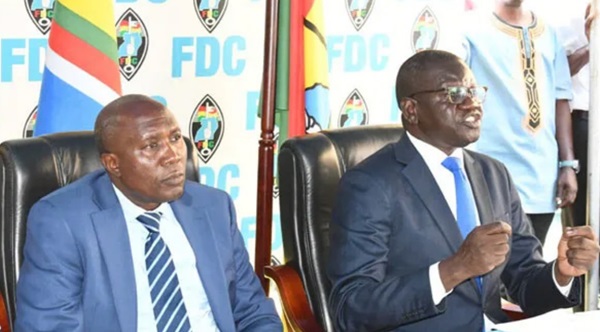
In the last three, Besigye ran on the FDC ticket maintaining FDC as a dominant force in the Ugandan body politic. In 2001, Besigye scored 27% representing 2million votes against Museveni’s 69% with 5million votes.
In 2005, Besigye was nominated from jail while facing charges of treason, misprision of treason, rape, and illegal possession of weapons. FDC had been launched the year before while Besigye was in exile in South Africa.
There was strong consensus about Besigye being its presidential candidate because of his political pedigree: he had stood in 2001 and roiled the NRA state provoking fierce backlash that led to violence and arrests of his agents and ultimately drove him to exile.
From 2001, various political actors were agitating for a way forward and as a result, Parliament Advocacy Forum (PAFO) and Reform Agenda came together to form FDC. Politicians like Reagan Okumu, Ogenga Latigo, John Kazoora, Augustine Ruzindana, Miria Matembe, Abdul Katuntu, Salamu Musumba Jack Sabiti, James Garuga Musinguzi, and Amanya Mushega converged to form the party. A good number had been MPs; from the Movement and from the Opposition when the country was under the single party system.
In 2006, Besigye ran his second time against Museveni and polled 37% with a 2.5million vote tally with Museveni getting 59% representing 4.1million votes. In 2011, Besigye got 26% with 2million votes and 2016, he improved his output by bagging 35% with 3.5million votes. Between 2011 and 2016, Museveni’s vote percentage fell from 68-60%.
Besigye factor
After serving two terms as elected FDC President and three times as a presidential flagbearer, Besigye stood down in 2012 paving the way for other leaders to rise and take over the mantle. In his decision to leave the leadership, Besigye said he did not want his individual pursuit of freedom and change to derail the party from its agenda—a decision that won him admirers and critics as well.
He has endured violent arrests, prosecution, jail time and the hostilities have extended to his kin. After the 2016 presidential election, Besigye was arrested and hauled off to Kitgum where he was charged with treason. Besigye’s arrest after the election could have perhaps shown why he had stepped down four years earlier from the burdensome post of party president.
When he stepped down, two heavyweights slugged it out in the 2012 FDC presidential election; Nandala Mafabi and Mugisha Muntu. Besigye who towers over the party like a colossus, did not publicly support any of the two but was said to have a soft spot for Nandala. Muntu trounced Mafabi in an election marred by mudslinging where the Nandala camp accused Muntu of being a mole.
The rivalry between the two leaders festered and it appeared to be the start of rival factions in the party that was founded to offer an alternative vision to the ruling NRM.
After five years of Muntu’s term defined by a call from the party president to build organizational capabilities, patience wore out with Muntu—a former army commander said to be disciplined—when party faithful elected Amuriat, a Besigye protégé, at the national delegates’ conference held at Namboole in November 2017.
Amuriat’s election marked a new chapter as he had Nandala’s backing too. Those disgruntled with Muntu, had already formed the Katonga Road Office and Amuriat then belonged to the latter branch.
The election of Amuriat was a reversal of the 2012 delegates’ conference where Muntu beat the Nandala group. In 2018, Muntu formally quit the party and founded Alliance for National Transformation.
Amuriat, a little known politician who had kept by Besigye’s side triumphed over Muntu, a well-known national figure in an election where FDC ideological differences played out again. In all the maneuvering, Besigye had been the common denominator. Amuriat was Kumi County MP from 2001-2016 and also a founder member of FDC as part of PAFO. However according to analysts, he has miserably failed to fit in Besigye’s shoes.
In 2021, Amuriat contested for president and perhaps the only memorable thing about his campaign was his arrest after nomination where police confiscated his shoes and in protest, he ran a barefooted campaign.
He scored a measly 3.26% in perhaps a campaign that many FDC supporters would want to forget. Two years later, the fallout had escalated between Amuriat and his mentor reaching a point of lambasting Besigye publicly.
Now eyes are on FDC or what is left of it to see what card it will play for the 2026 elections where it is playing catch up with new entrants.
 The Independent Uganda: You get the Truth we Pay the Price
The Independent Uganda: You get the Truth we Pay the Price

